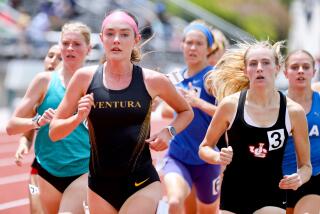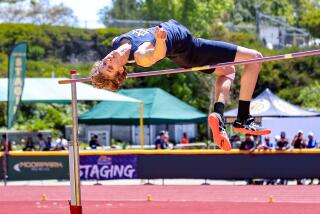Sherri Hall’s Day Is Never Done, but There Are Races to Be Won : Running: Recent Southern California College graduate, a track standout at 39, will soon qualify for Masters competition.
- Share via
COSTA MESA — On the dreariest of the gray mornings of this so-called summer, Sherri Hall awoke early for the training runs that help her organize another grueling day.
“(Running) just keeps me healthy and strong,” Hall said. “It gives me energy for everything I have to do in the day.”
And that is plenty. A single mother of two, Hall usually runs before her shift as a registered nurse at Fountain Valley Regional Hospital. The job provides the checks that pay the mortgage on the Hall house and keeps the family in groceries. The runs provide physical and psychological benefits for Hall, who in January was divorced from her husband of 18 years.
But running is more than a salve for Hall’s psyche. For the past three years, she was the top long distance runner at Southern California College, a National Assn. of Intercollegiate Athletics school in Costa Mesa.
Before she graduated with a bachelor’s degree in psychology in May, Hall had become the school’s first woman to earn All-American honors in both cross-country and track.
Now she’s running for herself, recovering from knee surgery and awaiting her 40th birthday this month. Turning 40 will put her in the Masters division and allow her to continue competing.
“I only feel 30. I can’t stand it,” Hall said. “Age never bothered me, but I think being in school with all the emphasis that was put on it has kind of made me not like it too much.
“Turning 40 is kind of a weird milestone. The only thing good about turning 40 is that I’ll be a Master (in) running and I know I can be competitive.”
Age has always been part of Hall’s story, which didn’t begin until she was 31 and started running on a whim. She and her husband had just moved to Costa Mesa from Colorado as the running craze of the early 1980s peaked, and her husband suggested they try it.
Aside from doing some aerobics after turning 30, Hall had led a mostly sedentary lifestyle, but she soon was outpacing her husband without much effort.
She joined a running club and the sport became a recreational passion. Four years later, in 1988, the passion paid off when she decided to return to college. SCC fit her criteria--it was Christian and close to home--and the combination of an athletic and academic scholarship provided all the financial aid she needed.
However, she wasn’t prepared for the low-level sensation her presence created.
“I knew it was rare the minute I walked onto campus,” Hall said. “Everyone was 19 and 20 years old. I never felt old until I went to school there.
“I was shocked at first. I felt kind of funny about it. The kids on the team called me mom and stuff like that. They always kidded me about my age. But I never thought that I shouldn’t be doing this because of my age. I did get so much publicity for it. I still didn’t understand what the big deal was.”
The novelty was simply that she was competing against opponents almost half her age and winning. She won two NAIA District 3 10,000-meter championships and one district cross-country title. She finished fifth in the 10,000 meters at the 1990 NAIA national track championships and ninth at the 1990 cross-country championships. She was also honored as a national scholar athlete because of her 3.5 grade-point average. If not for a knee injury that ended her final track season, she was prepared to compete in either the 5,000 and 10,000 or the marathon at the 1991 championships.
Hall had tried to run through the knee injury but finally agreed to the surgery in March.
“I usually can run through all my injuries but this was like a knife in my knee,” she said. “I could not do it. It was awful.”
Before the operation, her doctors were pessimistic about her chances for a full recovery because of her age.
Instead, the surgeon said, “ ‘Your knees are made for running; they’re perfect. You’ve got many years left,’ ” Hall said.
“I was so happy because I was really afraid they were going to say that there’s degenerative arthritis in there and that would end my running.”
Six weeks after the operation, Hall returned to the SCC track team for one 10,000-meter race--the district championships--but she wasn’t physically ready and finished fifth, about four minutes slower than her personal best.
Since then she has progressed steadily, building her training miles and running in local road races to get in shape. In July, she ran in the Bastille Day 8K, finishing second in her age group, and in August, she won the women’s division of a 5K in Irvine.
“You race and race and race in college and almost don’t like it sometimes,” she said. “You get burnt out. This is really fun to see that I love racing now. I love the feel of it. I love the competitiveness. I’m just loving racing now.”
When she turns 40 on Sept. 30, Hall will enter another competitive level. Deann Gutowski, an assistant at SCC who was a national-class 800-meter runner in the early ‘80s, is coaching her and believes Hall will be able to lower her best time in the 10,000 from 36 minutes 15 seconds to the 33-34 level.
Said SCC Coach Bryan Wilkins: “I know she’s capable of running in the 35s, possibly down around 35-flat. Any faster than that, she’s going to have to put in a lot of time and effort. I’m not saying she’s not capable because she has the determination you need.”
With that much improvement, Hall would break the U.S. Masters record of 35:20 and possibly move into position to be sponsored by a shoe company. The opportunities for income for Masters runners are growing although few are in the range of Priscilla Welch, 46, of England, who holds the world Masters bests in the 10K (32:25) and the marathon (2:26:51). Welch, who had her own Nike television commercial and whose times rank among those of the top open runners, has made about $40,000 in road-racing prizes the past two years.
Hall likely won’t make much money from her running, but that never was her intention. She understands that she’ll have to support herself and her two children, Chris, 18, and Sarah, 11, by more conventional means.
She hopes to return to school to get the advanced degree required to be a Christian family counselor, but she hasn’t found a way to cover the costs.
In the meantime, she will continue to work the 12-hour emergency-room shifts that make her legs ache.
“I have come home from 12-hour shifts and run because I’m determined this work isn’t going to take my running away.”


